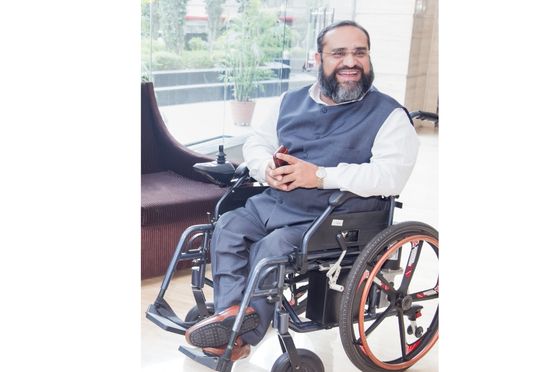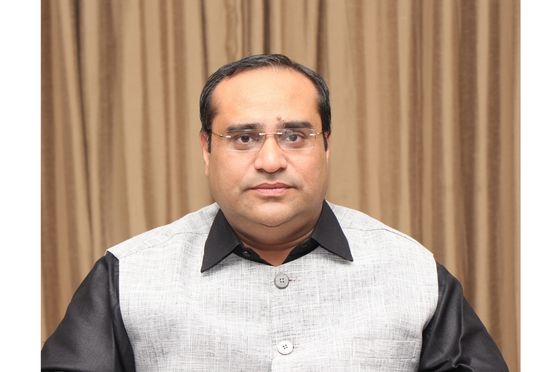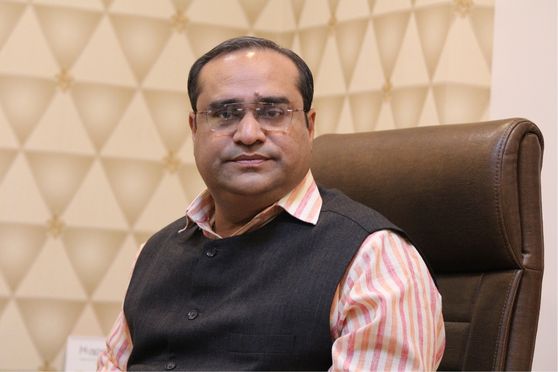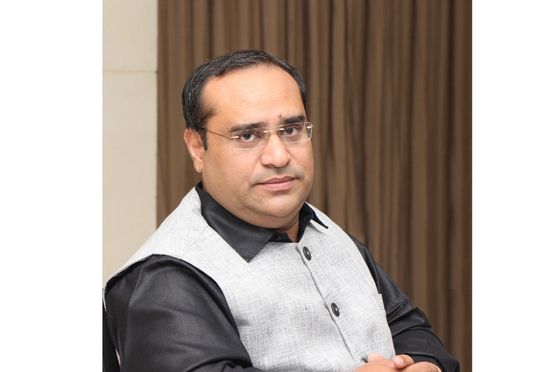Meet Mr Ajay Gupta, the man with callipers and crutches making it big in the entrepreneurial world


Entrepreneurship is a broad term having vast social implications as it contributes to the overall socio-economic development of the corporate world and society as a whole. While entrepreneurs often meet different challenges in their venture it is their passion which keeps driving them forward to reach the top. Our expert for today, Mr Ajay Gupta, highlights how he overcame all challenges to establish himself as a successful entrepreneur. Read on to know more..
About Mr Ajay Gupta: Ajay Gupta is a successful serial entrepreneur and best-selling author. Ajay has successfully set up business ventures in education, technology, and healthcare. He established his organisation, S.K. Educations Pvt. Ltd. in the year 1999. He is the founder of Bachpan Play Schools and Academic Heights Public Schools, and he co-founded Rishihood University and Must & More Diagnostic Centre. Also, Ajay Gupta is the co-founder of Prismart Productions. It must be stated that all his successes, forward-thinking, and innovation are not limited to education and technology. He also ventured into healthcare with Must & More Diagnostic Centre, which is the largest of its kind in Delhi. Ajay Gupta has lived with disabilities due to polio since he was 9 months old. Both his lower limbs and the left upper limb are paralysed. He had been using callipers and crutches and now has a wheelchair to move and travel. Yet, with his sheer determination and self belief he has not only made his name in the world of business but also continues to inspire thousands of budding entrepreneurs to face every challenge with a sign of hope and positivity.
1. Technology is an ongoing trend in Early Childhood Education (ECE)—as it is in pretty much every industry. It’s a constant balance for ECE experts to decide how to teach with technology. How is Bachpan maintaining this balance?
When I thought of starting Bachpan Play School back in 2004, I wanted to provide a futuristic kind of education to all children across the nation. Technology, for one, is an important part of any such vision. So, I endeavoured to make Bachpan tech-driven in its educational approach. We have Smart Classes, Speak-O-Kit, Robotime, AV Room, and VR. The fact that technology drives learning at Bachpan does not mean that our Bachpanites lose touch with nature. We conduct different kinds of extra-curricular activities for the kids, like educational trips, excursions, and puppet shows. I believe that such activities help us maintain a kind of balance between everything.
2. Is the Indian education system disabled-friendly? Do you think it can be changed?
No, I do not think that the Indian education system is disabled-friendly yet. I admit that technology has eased things somewhat and made education accessible in the form of online classrooms, but traditional classrooms are still the need of the hour because they are conducive to holistic learning. It is this that I talk about when I say that our education system is not disabled-friendly yet. Most of the schools in India do not have ramps for the physically challenged, special tutors for children who suffer from learning disabilities, or braille signs and contrast colours for the visually impaired. Most of all, it is inclusivity that we lack in our schools.
We need to spread awareness about accessibility measures and their necessity to bring about much-needed changes. When people develop inclusive mindsets, it becomes easy to turn things in the right direction.

3. Do different disabilities present different barriers to self-employment or business start-up? If so, what are they?
Indeed, different disabilities present different barriers to self-employment and business start-up. When someone is physically or visually challenged or challenged in any way, things become hard. For instance, business networking is a key factor in an individual’s success. So, when people find it tough to see beyond a person’s disabilities, business connections do not get established. It is also not just about business connections. It is also about how customers view businesses or start-ups initiated by people with disabilities. Furthermore, it is about accessibility issues. When entrepreneurs with disabilities cannot access the resources required to make their businesses thrive, obstacles have better chances of winning. All of this is greater in the case of visual disabilities.
When there are invisible disabilities like the ones related to speech or mind, challenges are different. They relate more directly to competence itself. Also, challenges aggravate with regard to gender, age, and ethnicity. However, I think that the result of all such disabilities is ultimately the same, and it takes relentless courage to rise above all these barriers with full confidence.
4. Your early life and entrepreneurial journey are quite inspiring in their own right. What, according to you, are some of the main policy tools available to help those with disabilities become more entrepreneurial?
There are quite a few policies in India that enable people with disabilities to apply for loans, receive skills training, become self-sufficient, and contribute to the nation's progress. Such policies do give a head start to people with disabilities who in most cases do not have access to capital and quality education. This all, thus, paves the way for new entrepreneurs who might not receive quality paid work otherwise.
But I think that our government needs to come up with more and more policies and ensure that information regarding those policies and programs is clearly accessible to people with disabilities. They should know what opportunities are out there for them. Also, we need to customise the initiatives while keeping the additional disadvantages related to gender, age, class, and ethnicity in mind. All this would help ensure that people with disabilities can live a life of dignity and achieve a balance between their disabilities and work life. Entrepreneurship is actually a great way to go.
5. You have accomplished great things. But there's a perception that disabled individuals are underrepresented in business. Would you mind sharing a story of a time when others didn't take you seriously as an entrepreneur?
There have been many such times in my life. When I was growing up, my family decided that it would be better for me to sit in our family sweets shop and manage the business. However, I wanted to have a business of my own, and my entrepreneurial spirit always pushed me to create and explore opportunities for myself.
Then the time came when I finally decided to start Bachpan, our preschool chain. I didn't have such a big team at that point in time, so I used to visit my customers with callipers and crutches to assist me. It took immense effort as they did not take me seriously often, but I believe that some dreams and visions are just worth it all. So, it was Bachpan for me. I faced numerous social setbacks in my endeavours, as do many people out there with disabilities. Never giving up is, according to me, what has brought me so far.
I am confident that when each and every person develops their persevering spirit, there will not be anything like underrepresentation. However, for that to happen, accessibility and inclusivity have to be promoted to raise the self-confidence and self-esteem of every aspiring entrepreneur.

7. In recent years, deliberate attempts have been made to internationalise education. Do you believe that this is a development that the education system should anticipate in the near future?
Yes, I believe that there should not be any kind of boundaries, national or otherwise, when it comes to educating our young and future generations. International standards or regional standards, anything that improves any education system, should guide us in our future endeavours and we should take active steps in this direction while always being ready to embrace the dynamic changes with open arms. For instance, the Montessori Play-Way Method, has been really fruitful for us in the preschool segment, and it did not originate in our country as such.
8. What steps is your school taking to teach the future generation to treat people from all backgrounds and traits with equal respect?
We are expanding our Bachpan Play Schools and Academic Heights Public Schools into every nook and corner. We are aiming to reach the remotest corners of our nation just so that all kids receive quality education, irrespective of location and background.
Our extra-curricular activities are one of our strengths. We conduct regular activities where kids get to interact with community helpers and other people of diverse backgrounds. We celebrate days such as International Day of Sign Languages in our schools, wherein our students get to learn the basics of sign language and get rid of social barriers. We inculcate love, faith, and hope in the kids.

9. Final question (and hopefully an interesting one for our readers): If you could provide any piece of advice to someone considering establishing their own company, what would it be?
Do not be afraid to take risks. In my entrepreneurial journey, this is what I have done all along, and this is what has benefitted me the most. When we take risks and apply new approaches to our way of working and living, this opens the door to new results and possibly better ones! But if we keep doing the same things just because they are "safe" to do, we will keep getting the same results. So, taking risks is synonymous with innovation and discretion, in my view. Keep innovating. Keep taking risks "smartly" and wisely.
Questions about disability keep coming up time and time again and can seem old or trivial at different points of time. Entrepreneurship is majorly a dynamic procedure of innovating something worthwhile that works towards increasing wealth and affecting the well-being of society as a whole and as our expert Mr Ajay Gupta says that once you are not afraid to take risks you are good to go.